from Apr. 16, 1865
The Martyr President
-
Full Title
The Martyr President: Our Grief and Our Duty
-
Description
Memorial oratory delivered by J.G. Butler, Pastor of St. Paul's Church on Easter Sunday Apr. 16, 1865.
-
Source
Springer Collection, Oakland University Special Collections
-
Rights
This item may be reproduced and used for any purpose, including research, teaching, private study, publication, broadcast, or commercial use, with proper citation and attribution.
-
Tags
-
Cite this Item
J.G. Butler. "The Martyr President: Our Grief and Our Duty". McGill&Witherow. Remembering Lincoln. Web. Accessed October 4, 2025. https://rememberinglincoln.fords.org/node/814
from Apr. 16, 1865
The Martyr President: Our Grief and Our Duty
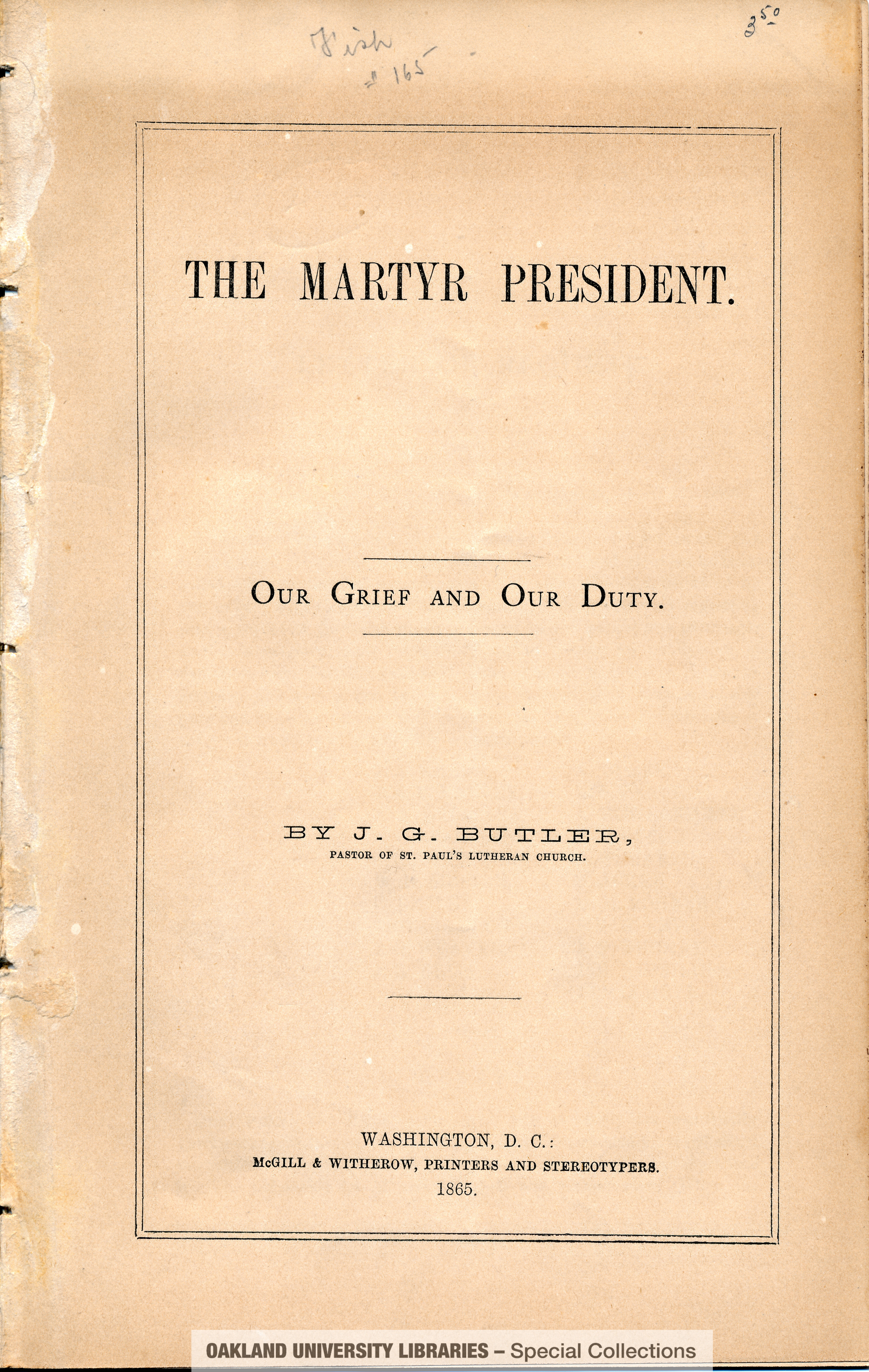
-
Description
Memorial oratory delivered by J.G. Butler, Pastor of St. Paul's Church on Easter Sunday Apr. 16, 1865.
-
Source
Springer Collection, Oakland University Special Collections
-
Rights
This item may be reproduced and used for any purpose, including research, teaching, private study, publication, broadcast, or commercial use, with proper citation and attribution.
-
Creator
J.G. Butler
-
Publisher
McGill&Witherow
-
Date
April 16, 1865
-
Material
paper
-
Dimensions
8 1/2"h x 5 1/2"w
from Feb. 12, 1866
In Memoriam of Abraham Lincoln
-
Full Title
In Memoriam of Abraham Lincoln, the Martyr President of the United States
-
Description
Eulogy delivered by the famous historian and statesman George Bancroft at the request of Congress in front of the House of Representatives on February 12, 1866. Originally published by the Government Printing Office, it was reprinted numerous times.
-
Source
Springer Collection, Oakland University Special Collections
-
Rights
This item may be reproduced and used for any purpose, including research, teaching, private study, publication, broadcast, or commercial use, with proper citation and attribution.
-
Tags
-
Cite this Item
George Bancroft. "In Memoriam of Abraham Lincoln, the Martyr President of the United States". L. Towers. Remembering Lincoln. Web. Accessed October 4, 2025. https://rememberinglincoln.fords.org/node/813
from Feb. 12, 1866
In Memoriam of Abraham Lincoln, the Martyr President of the United States
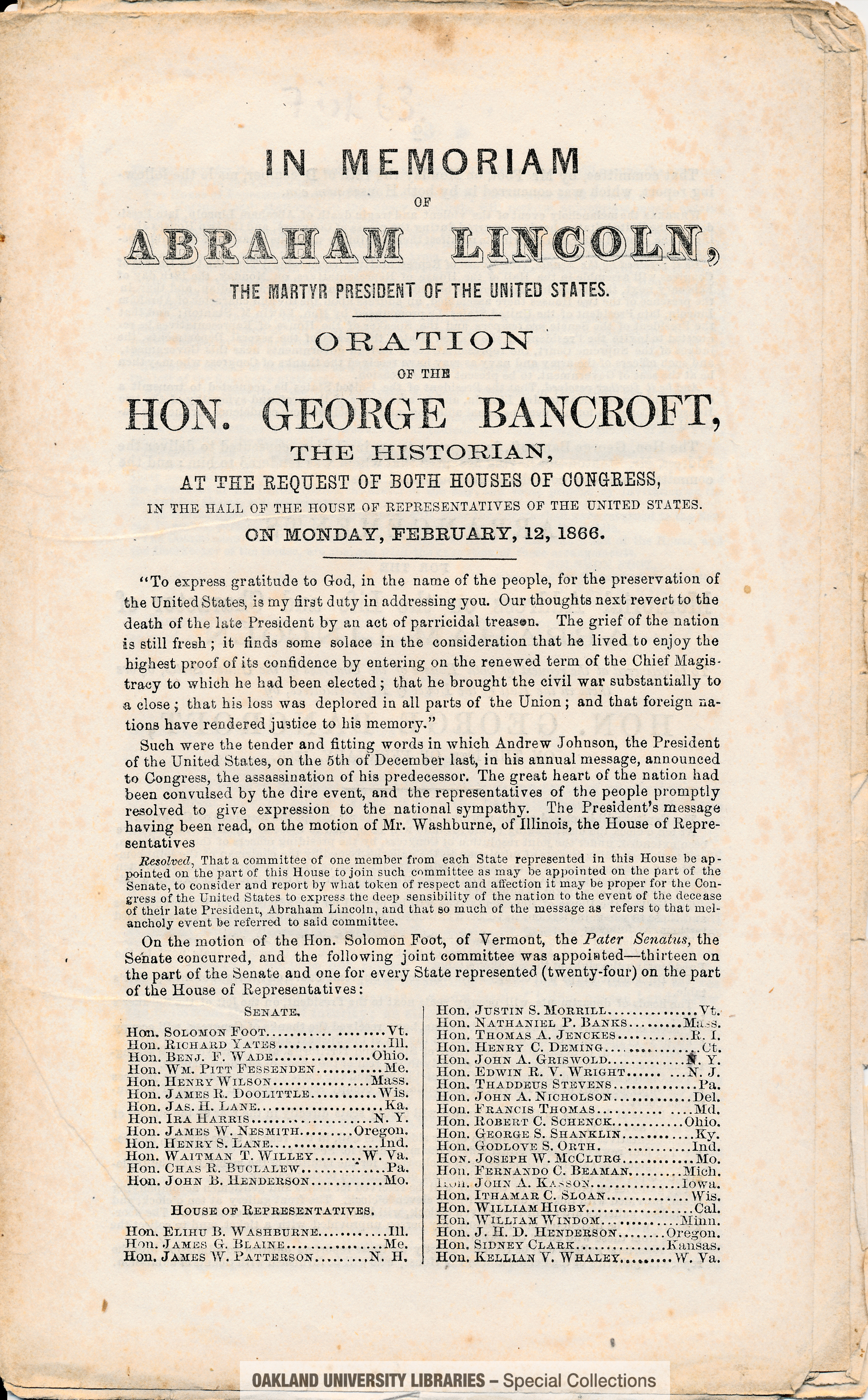
-
Description
Eulogy delivered by the famous historian and statesman George Bancroft at the request of Congress in front of the House of Representatives on February 12, 1866. Originally published by the Government Printing Office, it was reprinted numerous times.
-
Source
Springer Collection, Oakland University Special Collections
-
Rights
This item may be reproduced and used for any purpose, including research, teaching, private study, publication, broadcast, or commercial use, with proper citation and attribution.
-
Creator
George Bancroft
-
Publisher
L. Towers
-
Date
February 12, 1866
-
Material
paper
-
Dimensions
9 1/2"h x 6"w
from Dec. 15, 1865
Abraham Lincoln, a Speech
-
Full Title
Abraham Lincoln, a Speech
-
Description
In this speech, Frederick Douglass reflected on how the outpouring of joy at the conclusion of the Civil War turned to mourning with Lincoln’s assassination. His death, according to Douglass was not only tragic, but also prevented recently freed slaves and African Americans from gaining the ear of wise and well-intentioned leader. Towards the end of his speech, Douglass pondered how life would have been different had Lincoln not perished in April, lamenting that his death was a great blow against African American rights.
-
Transcription
Colored men, first to the brave Colored Soldiers who had fought under our flag and second to the very intelligent part of the Colored population South. This declaration on his part though it seemed to mean but little meant a great deal. It was like Abraham Lincoln. He never shocked prejudices unnecessarily. Having learned Statesmanship while splitting rails, he always used the thin edge of the wedge first, and the fact that he used this at all meant that he would if need be, use the thick as well as the thin. He saw the absurdity of asking men to fight for a Government which should degrade them, and the meanness of enfranchising enemies and de-franchising friends. He was a progressive man, a humane man, an honorable man, and at heart an antislavery man. He had exhausted the resources of conciliation upon rebels and slaveholders and now looked to the principles of Liberty and justice, for the peace, security, happiness and prosperity of his Country. I assume therefore, had Abraham Lincoln been spared to see this day, the negro of the South would have more than a hope of enfranchisement and no rebels could hold the reins of Government in any one of the late rebellious States. Whosoever else have cause to mourn the loss of Abraham Lincoln, to the Colored people of the Country his death is an unspeakable calamity.
[Transcription by: Evan Laugen, Chandra Manning's class, Georgetown University]. -
Source
Frederick Douglass Papers, Manuscript Division, Library of Congress
-
Rights
This item is in the public domain and may be reproduced and used for any purpose, including research, teaching, private study, publication, broadcast or commercial use, with proper citation and attribution.
-
Tags
-
Cite this Item
Frederick Douglass. "Abraham Lincoln, a Speech". Remembering Lincoln. Web. Accessed October 4, 2025. https://rememberinglincoln.fords.org/node/812
-
Creator
Frederick Douglass
-
Date
Late December 1865
from Dec. 15, 1865
Abraham Lincoln, a Speech
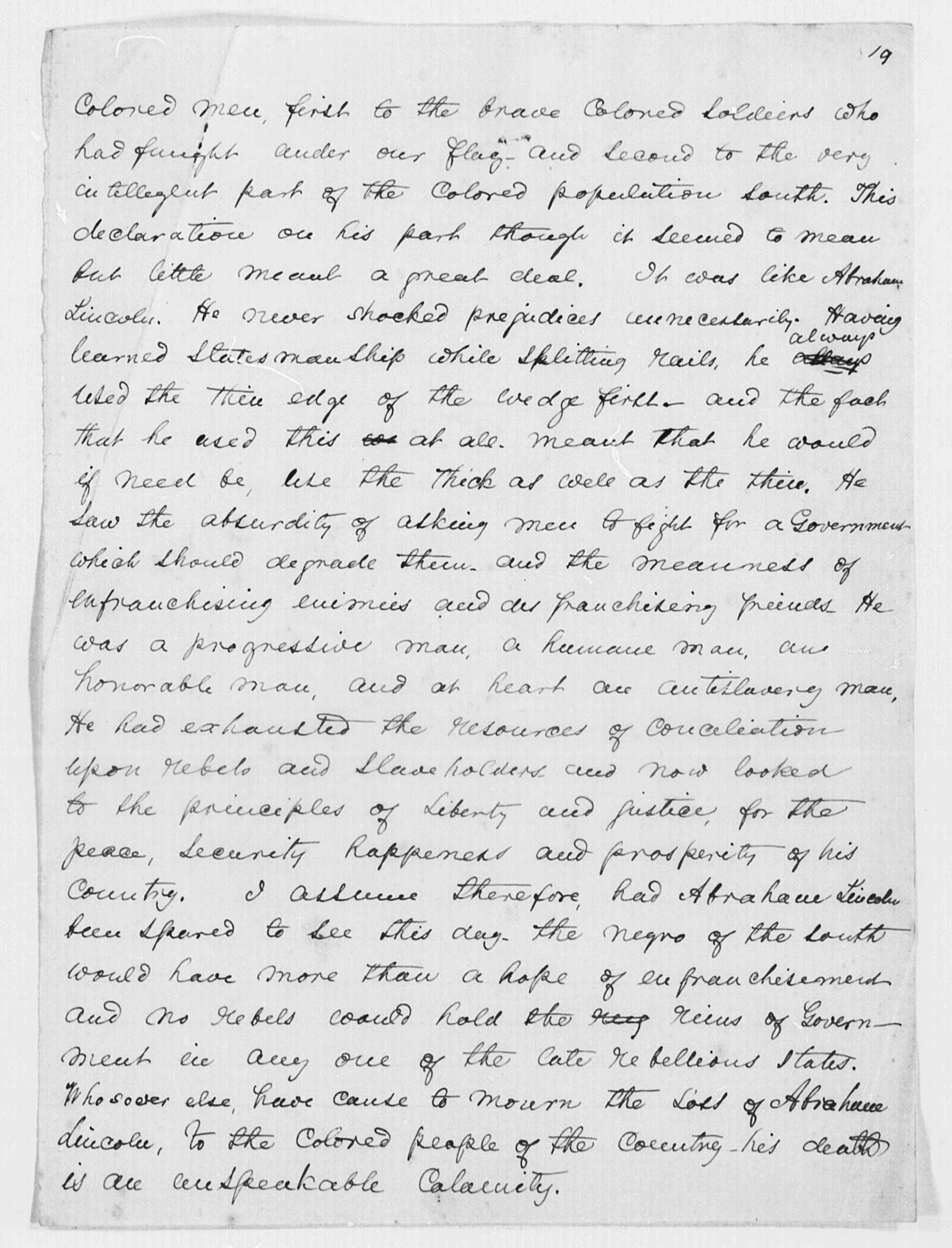
-
Description
In this speech, Frederick Douglass reflected on how the outpouring of joy at the conclusion of the Civil War turned to mourning with Lincoln’s assassination. His death, according to Douglass was not only tragic, but also prevented recently freed slaves and African Americans from gaining the ear of wise and well-intentioned leader. Towards the end of his speech, Douglass pondered how life would have been different had Lincoln not perished in April, lamenting that his death was a great blow against African American rights.
-
Source
Frederick Douglass Papers, Manuscript Division, Library of Congress
-
Rights
This item is in the public domain and may be reproduced and used for any purpose, including research, teaching, private study, publication, broadcast or commercial use, with proper citation and attribution.
-
Creator
Frederick Douglass
-
Date
December 15, 1865
from May. 1, 1865
The Martyr President
-
Full Title
The Martyr President
-
Description
Poem framed in mourning borders by Robert Newell, a popular humorist and political satirist. He boasted this poem was "written in a single evening."
-
Source
Springer Collection, Oakland University Special Collections
-
Rights
This item may be reproduced and used for any purpose, including research, teaching, private study, publication, broadcast, or commercial use, with proper citation and attribution.
-
Tags
-
Cite this Item
Robert H. Newell. "The Martyr President". Carleton, Publ.. Remembering Lincoln. Web. Accessed October 4, 2025. https://rememberinglincoln.fords.org/node/811
from May. 1, 1865
The Martyr President
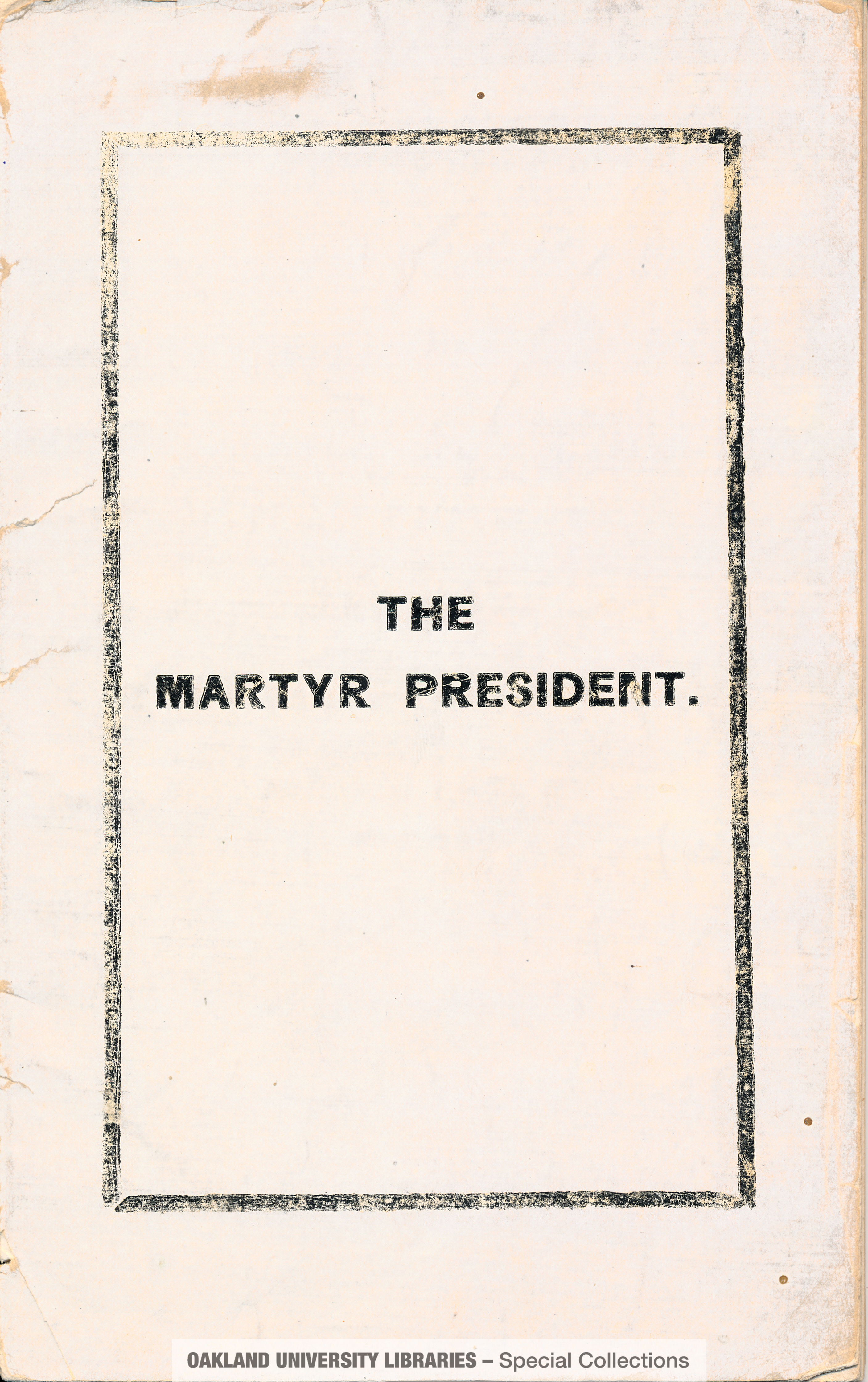
-
Description
Poem framed in mourning borders by Robert Newell, a popular humorist and political satirist. He boasted this poem was "written in a single evening."
-
Source
Springer Collection, Oakland University Special Collections
-
Rights
This item may be reproduced and used for any purpose, including research, teaching, private study, publication, broadcast, or commercial use, with proper citation and attribution.
-
Creator
Robert H. Newell
-
Publisher
Carleton, Publ.
-
Date
May 1, 1865
-
Material
paper
-
Dimensions
7 1/2"h x 4 3/4"w
from May. 2, 1865
Abraham Lincoln: Rede bei der Gedachtnissfeier
-
Full Title
Abraham Lincoln: Rede bei der Gedachtnissfeier in der Dorotheenkirche zu Berlin
-
Description
Cover of a 48-page German translation of "A discourse on the death of Abraham Lincoln delivered Tuesday, May 2, 1865, in the Dorotheen-Church, Berlin" by Henry P. Tappan.
-
Source
Springer Collection, Oakland University Special Collections
-
Rights
This item may be reproduced and used for any purpose, including research, teaching, private study, publication, broadcast, or commercial use, with proper citation and attribution.
-
Tags
-
Cite this Item
Henry P. Tappan. "Abraham Lincoln: Rede bei der Gedachtnissfeier in der Dorotheenkirche zu Berlin". H. Keller, Frankford am Main. Remembering Lincoln. Web. Accessed October 4, 2025. https://rememberinglincoln.fords.org/node/810
from May. 2, 1865
Abraham Lincoln: Rede bei der Gedachtnissfeier in der Dorotheenkirche zu Berlin
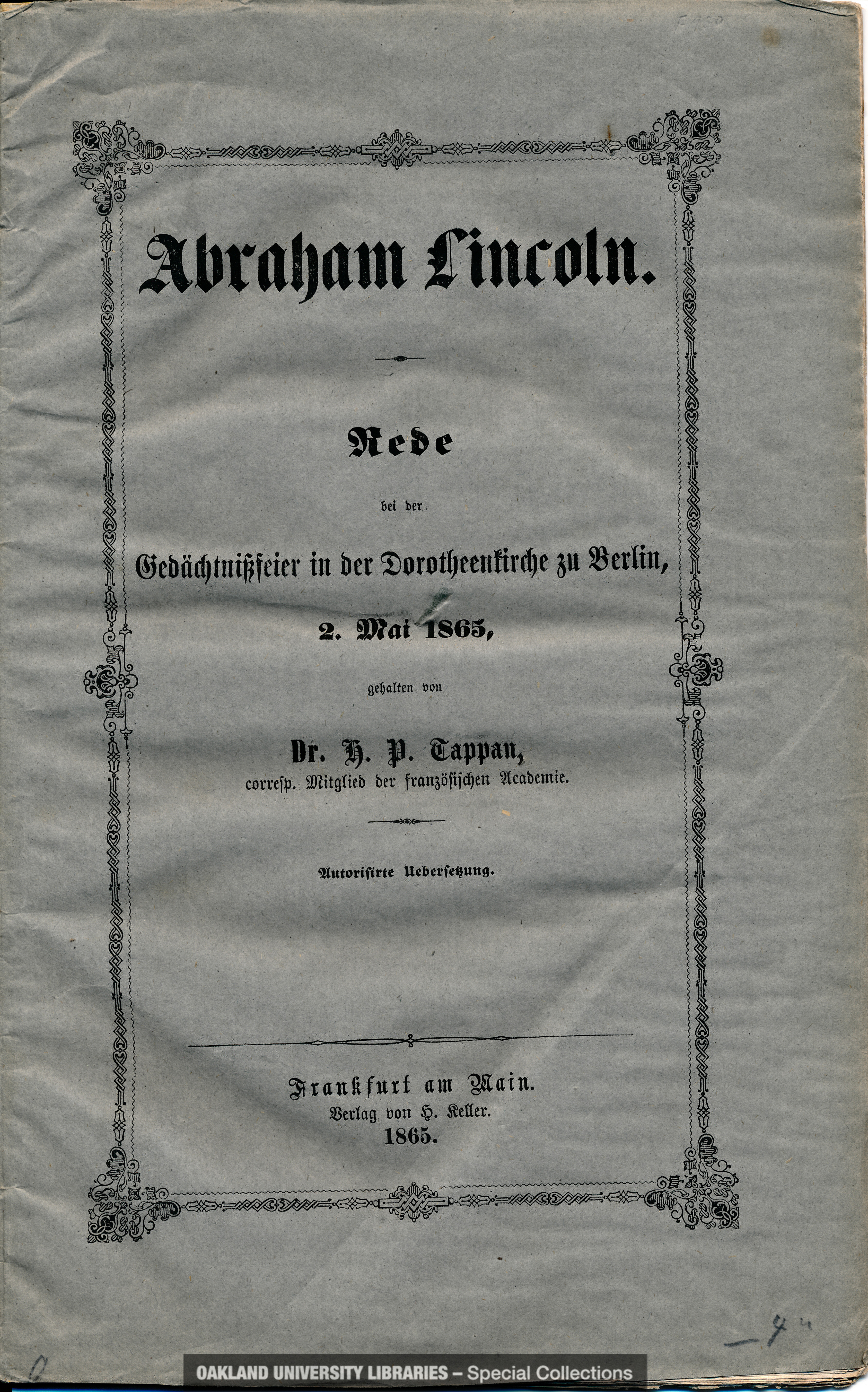
-
Description
Cover of a 48-page German translation of "A discourse on the death of Abraham Lincoln delivered Tuesday, May 2, 1865, in the Dorotheen-Church, Berlin" by Henry P. Tappan.
-
Source
Springer Collection, Oakland University Special Collections
-
Rights
This item may be reproduced and used for any purpose, including research, teaching, private study, publication, broadcast, or commercial use, with proper citation and attribution.
-
Creator
Henry P. Tappan
-
Publisher
H. Keller, Frankford am Main
-
Date
May 2, 1865
-
Material
paper
-
Dimensions
9"h x 5 3/4"w
from May. 1, 1865
Private and Public Life
-
Full Title
The Private and Public Life of Abraham Lincoln, by O. J. Victor
-
Description
Cover of a reprint of a 1864 biography of Lincoln. Framed in mourning borders. After the death of Lincoln, publishers rushed to put out biographies of the dead President.
-
Source
Springer Collection, Oakland University Special Collections
-
Rights
This item may be reproduced and used for any purpose, including research, teaching, private study, publication, broadcast, or commercial use, with proper citation and attribution.
-
Tags
-
Cite this Item
Orville J. Victor. "The Private and Public Life of Abraham Lincoln, by O. J. Victor". Beadle and Company. Remembering Lincoln. Web. Accessed October 4, 2025. https://rememberinglincoln.fords.org/node/809
from May. 1, 1865
The Private and Public Life of Abraham Lincoln, by O. J. Victor
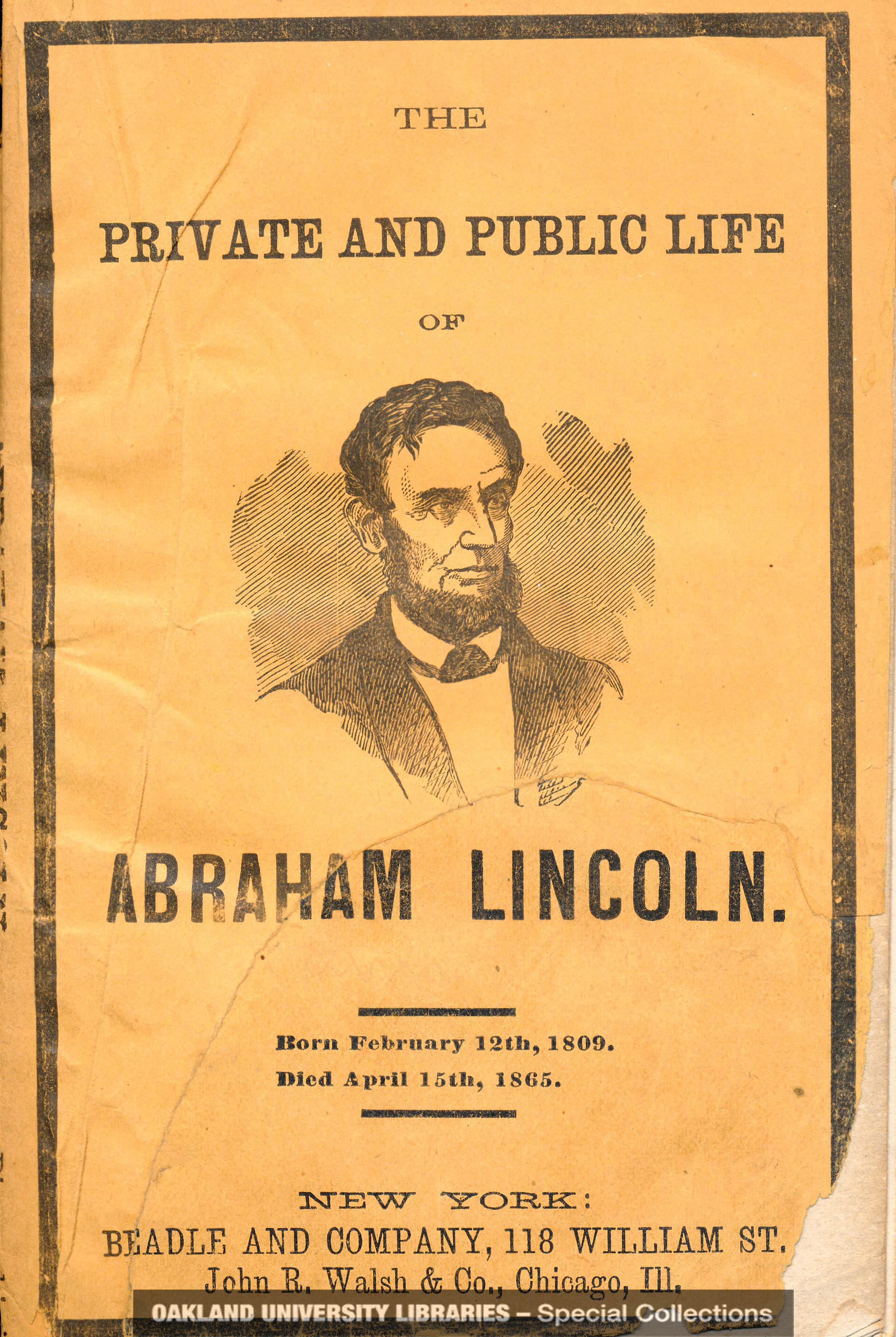
-
Description
Cover of a reprint of a 1864 biography of Lincoln. Framed in mourning borders. After the death of Lincoln, publishers rushed to put out biographies of the dead President.
-
Source
Springer Collection, Oakland University Special Collections
-
Rights
This item may be reproduced and used for any purpose, including research, teaching, private study, publication, broadcast, or commercial use, with proper citation and attribution.
-
Creator
Orville J. Victor
-
Publisher
Beadle and Company
-
Date
May 1, 1865
-
Material
paper
-
Dimensions
6 1/2"h x 4 1/8"w
from Jul. 22, 1865
Execution
-
Full Title
The Execution
-
Description
Cover of newspaper with illustration, caption reads: Execution of the Conspirators in Washington, D.C. - The Final Preparations- Appearance of the Criminals on the Scaffold - From a sketch by our special artist, D.B. Gulick.
-
Source
Springer Collection, Oakland University Special Collections
-
Rights
This item may be reproduced and used for any purpose, including research, teaching, private study, publication, broadcast, or commercial use, with proper citation and attribution.
-
Tags
-
Cite this Item
D.B. Gulick. "The Execution". Frank Leslie's Illustrated Newspaper. Remembering Lincoln. Web. Accessed October 4, 2025. https://rememberinglincoln.fords.org/node/808
from Jul. 22, 1865
The Execution
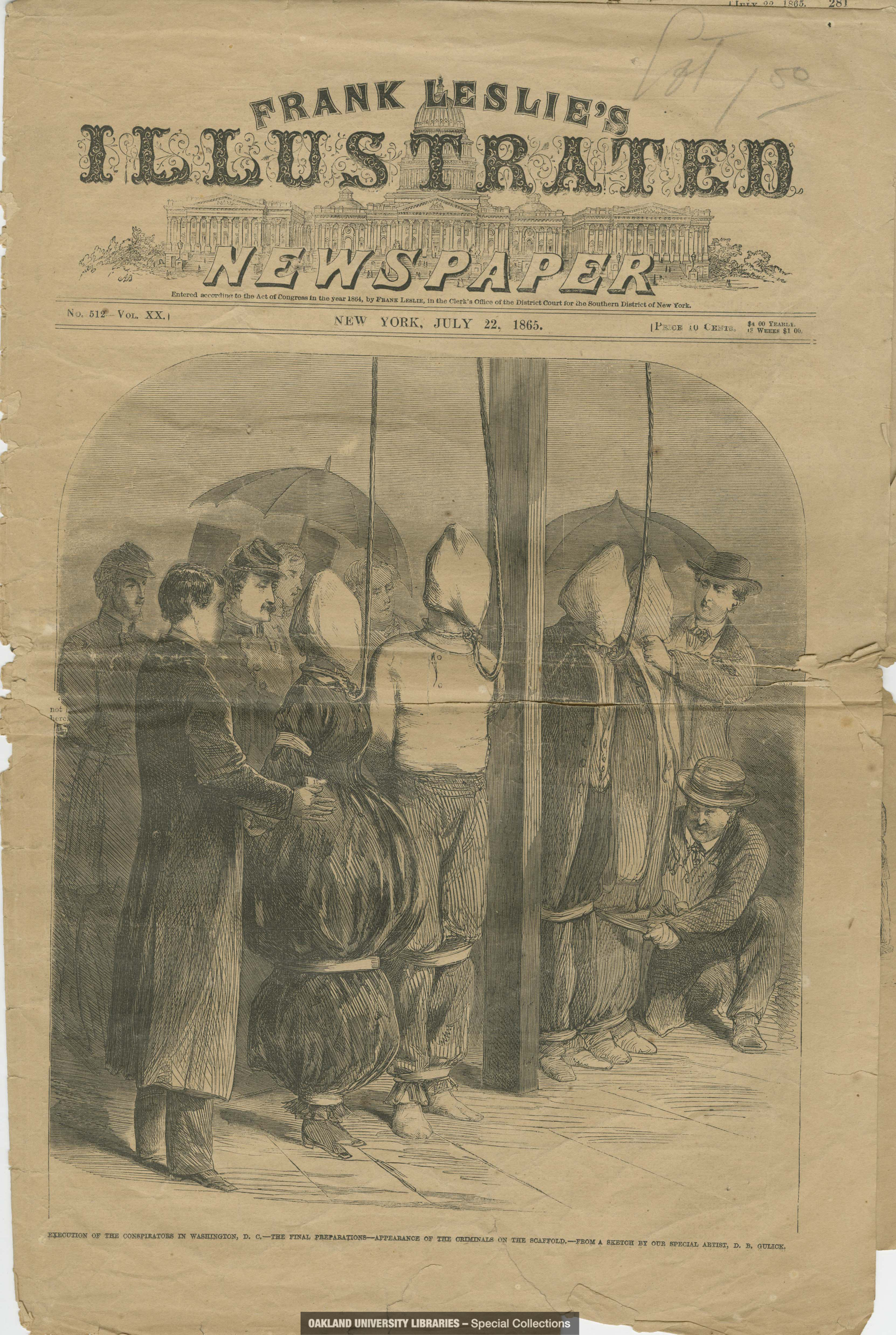
-
Description
Cover of newspaper with illustration, caption reads: Execution of the Conspirators in Washington, D.C. - The Final Preparations- Appearance of the Criminals on the Scaffold - From a sketch by our special artist, D.B. Gulick.
-
Source
Springer Collection, Oakland University Special Collections
-
Rights
This item may be reproduced and used for any purpose, including research, teaching, private study, publication, broadcast, or commercial use, with proper citation and attribution.
-
Creator
D.B. Gulick
-
Publisher
Frank Leslie's Illustrated Newspaper
-
Date
July 22, 1865
-
Material
paper
from Apr. 28, 1865
Booth Shot and Killed
-
Full Title
"John Wilkes Booth Shot and Killed"
-
Description
News article with bylines: J. Wilkes Booth shot and killed, His accomplice Harrold captured, Booth's body and Harrold's in Washington. The article gives details of the capture.
-
Source
Springer Collection, Oakland University Special Collections
-
Rights
This item may be reproduced and used for any purpose, including research, teaching, private study, publication, broadcast, or commercial use, with proper citation and attribution.
-
Tags
-
Cite this Item
Louisville Daily Journal. ""John Wilkes Booth Shot and Killed"". Louisville Daily Journal. Remembering Lincoln. Web. Accessed October 4, 2025. https://rememberinglincoln.fords.org/node/807
from Apr. 28, 1865
"John Wilkes Booth Shot and Killed"
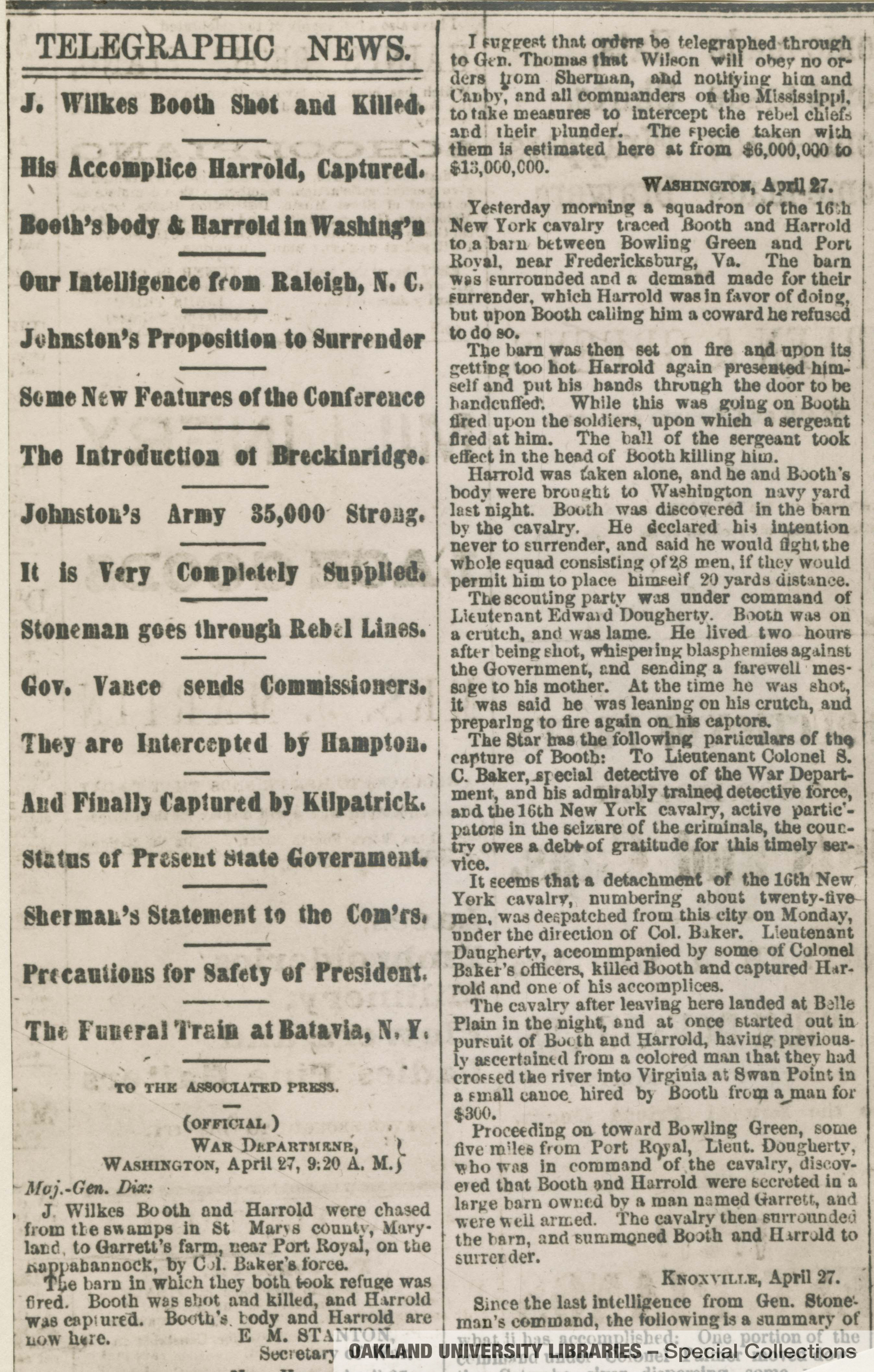
-
Description
News article with bylines: J. Wilkes Booth shot and killed, His accomplice Harrold captured, Booth's body and Harrold's in Washington. The article gives details of the capture.
-
Source
Springer Collection, Oakland University Special Collections
-
Rights
This item may be reproduced and used for any purpose, including research, teaching, private study, publication, broadcast, or commercial use, with proper citation and attribution.
-
Creator
Louisville Daily Journal
-
Publisher
Louisville Daily Journal
-
Date
April 28, 1865
-
Material
newspaper
from Sep. 18, 1866
Wilkes Booth and his Dead Body
-
Full Title
Wilkes Booth and his Dead Body [From the Cincinnati Union of Sunday]
-
Description
News article with details of what happened to the body of John Wilkes Booth.
-
Transcription
Wilkes Booth and his Dead Body. -
[From the Cincinnati Union of Sunday}
The Louisville Courier has the following:
“Wilkes Booth, whose body Secretary Stanton took so much pains to dispose of, so that no man should ever know the spot where it was buried, is reported to be in Europe. The story is that the man who ‘Boston Corbett’ so heroically shot, and whose body Stanton refused to exhibit to any one that ever saw Booth, was a poor wretch hired by the assassins to personate Booth, in order to facilitate the escape of the latter. Whether there be or be not any truth in this story, it will never cease to be a suspicious circumstance connected with the fate of Wilkes Booth, that Stan-ton refused to deliver the body that was brought up from Virginia to his friends or even to let them look upon it.”
Dating a couple of months from the time that Booth, the assassin of President Lincoln, was shot and killed by Boston Corbett, in the attempt to capture him, sensation stories like the above have been of frequent occurrence. Of course there is not a shadow of truth in the tale of Booth being still alive. The body was fully recognized as being that of Booth, and although tales were told about it be-ing secretly taken out to sea and sunk, and others about it being buried at mid-night, in an obscure place, by two men employed by Government, and who were sworn to secrecy, yet facts, known to but few, and carefully kept from the newspa-per press, show that the body was given over to the relatives of Booth, and that it was buried in either New England or in Canada.
The facts, as we had them at the time on authority not to be doubted, are as follows:
A few days before the body of Booth so mysteriously disappeared, our informant, a resident of New York, and favorably known as a dramatic writer, was called upon after bank hours to cash the draft of an undertaker, a near neighbor, who stated that he had received an order from the Booth family, to repair to Washington with a coffin, and there to receive the body of John Wilkes Booth, which would be surrendered to him on their order, and to convey it North for burial. The under-taker said he would return, and pass through New York, en route with the body, on a Thursday evening, or on Friday morning of the same week.
The morning after the undertaker left Washington, the report came by telegraph that the body had mysteriously disappear-ed—that it had been secretly buried—one report said in an old field, another in the Penitentiary yard, and still another that it had been taken to sea and sunk.
The undertaker did not return to his family until some days had elapsed. He came from the North, but declined to give any information relative to the place where John Wilkes Booth, under another name, had been buried. Should it get out, he said, the grave would be violated and the body removed, and the family were naturally anxious that this should not be.
These facts coming to us from the source they did, are more than sufficient to convince us, not only of the death of John Wilkes Booth, but that his body, with a pledge of secrecy freely given and fully kept, was given over to his family for burial, and that, except the relatives of Booth and the undertaker, no living being knows where the last remains of John Wilkes Booth are interred. No slab marks the last resting place of the assas-sin. The man who dug the grave knew not for whom it was intended, and in the burial permit was inserted a false name. In his unknown grave the assassin will lie until the grave gives up its sheeted dead, and all are called to judgement.
[Transcription by Alicia B., Ford's Theatre Society.] -
Source
Springer Collection, Oakland University Special Collections
-
Rights
This item may be reproduced and used for any purpose, including research, teaching, private study, publication, broadcast, or commercial use, with proper citation and attribution.
-
Tags
-
Cite this Item
Louisville Courier. "Wilkes Booth and his Dead Body [From the Cincinnati Union of Sunday]". Louisville Courier. Remembering Lincoln. Web. Accessed October 4, 2025. https://rememberinglincoln.fords.org/node/806
from Sep. 18, 1866
Wilkes Booth and his Dead Body [From the Cincinnati Union of Sunday]
![Wilkes Booth and his Dead Body [From the Cincinnati Union of Sunday]](https://rememberinglincoln.fords.org/sites/default/files/Remembering%20Lincoln_021.jpg)
-
Description
News article with details of what happened to the body of John Wilkes Booth.
-
Source
Springer Collection, Oakland University Special Collections
-
Rights
This item may be reproduced and used for any purpose, including research, teaching, private study, publication, broadcast, or commercial use, with proper citation and attribution.
-
Creator
Louisville Courier
-
Publisher
Louisville Courier
-
Date
September 18, 1866
-
Material
newspaper
from Apr. 17, 1865
Proceedings of a Called Meeting
-
Full Title
Proceedings of a called meeting of ministers of all religious denominations in the District of Columbia, in the First Baptist Church on Thirteenth Street, Monday, April 17
-
Description
Minutes of a meeting of ministers of various denominations in Washington, D.C. to organize a response to the assassination and burial of President Lincoln. Includes remarks by Rev. Gurley, who was a close friend of the Lincolns during his time as Chaplain of the United States Senate. He preached the funeral sermon at the White House on April 19.
-
Source
Springer Collection, Oakland University Special Collections
-
Rights
This item may be reproduced and used for any purpose, including research, teaching, private study, publication, broadcast, or commercial use, with proper citation and attribution.
-
Tags
-
Cite this Item
Phineas Densmore Gurley. "Proceedings of a called meeting of ministers of all religious denominations in the District of Columbia, in the First Baptist Church on Thirteenth Street, Monday, April 17". McGill & Witherow. Remembering Lincoln. Web. Accessed October 4, 2025. https://rememberinglincoln.fords.org/node/805
from Apr. 17, 1865
Proceedings of a called meeting of ministers of all religious denominations in the District of Columbia, in the First Baptist Church on Thirteenth Street, Monday, April 17
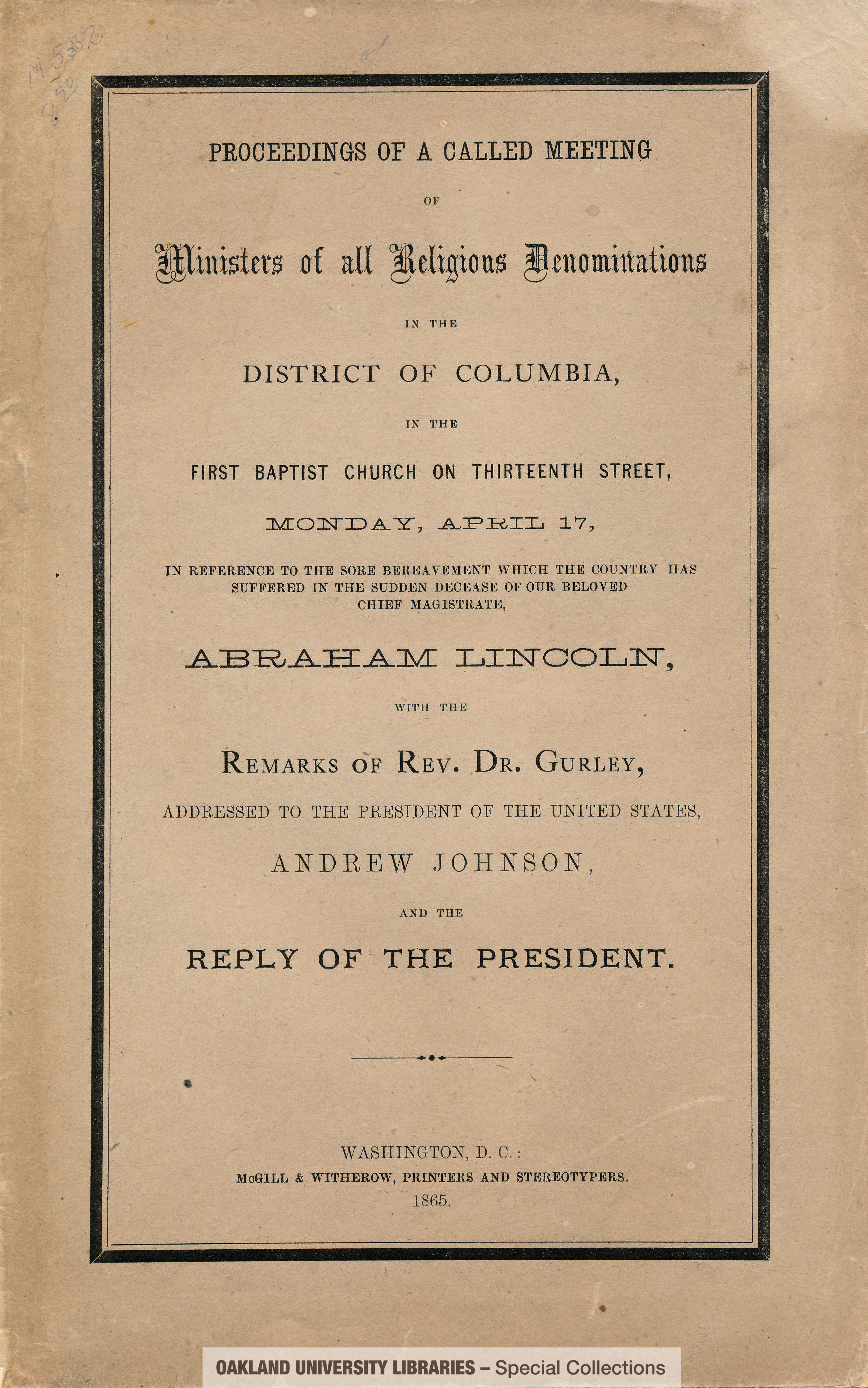
-
Description
Minutes of a meeting of ministers of various denominations in Washington, D.C. to organize a response to the assassination and burial of President Lincoln. Includes remarks by Rev. Gurley, who was a close friend of the Lincolns during his time as Chaplain of the United States Senate. He preached the funeral sermon at the White House on April 19.
-
Source
Springer Collection, Oakland University Special Collections
-
Rights
This item may be reproduced and used for any purpose, including research, teaching, private study, publication, broadcast, or commercial use, with proper citation and attribution.
-
Creator
Phineas Densmore Gurley
-
Publisher
McGill & Witherow
-
Date
April 17, 1865
-
Material
paper
-
Dimensions
9" h x 5 5/8" w
